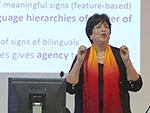In this presentation I review the history of bilingual education in the United States, focusing on its social justice origins in the 1960s. I trace the participation of the Latino community in the early struggle for equal educational opportunity in the form of bilingual education. And I look at how that space has shrunk as a result of legislation that has silenced the word bilingual and promoted what we now know as dual language education.
Focusing on the effects of these discursive and programmatic changes in New York City, I consider how spaces to equitably educate Latino children bilingually have shrunk, while bilingualism in education has been moderately extended to language majority children. And yet, the strict separation of languages in these two-way dual language programs (and the categorization of children) have robbed Latino bilingual children of educational spaces where their language practices are legitimized and leveraged to learn. I end by considering how the concept of translanguaging has helped pry open the possibility of tending to bilingual children’s capacities within these programs, and give examples of how this is being done.
Ofelia García is Professor in the Ph.D. program of Urban Education and of Hispanic and Luso-Brazilian Literatures and Languages at the Graduate Center of the City University of New York.
Autor: Servei d'Audiovisuals. Facultat de Ciències de l'Educació
Expedient: 81.106
Data:2017-05-19 10:56
Publicació: 05/19/2017
Durada: 52 min

